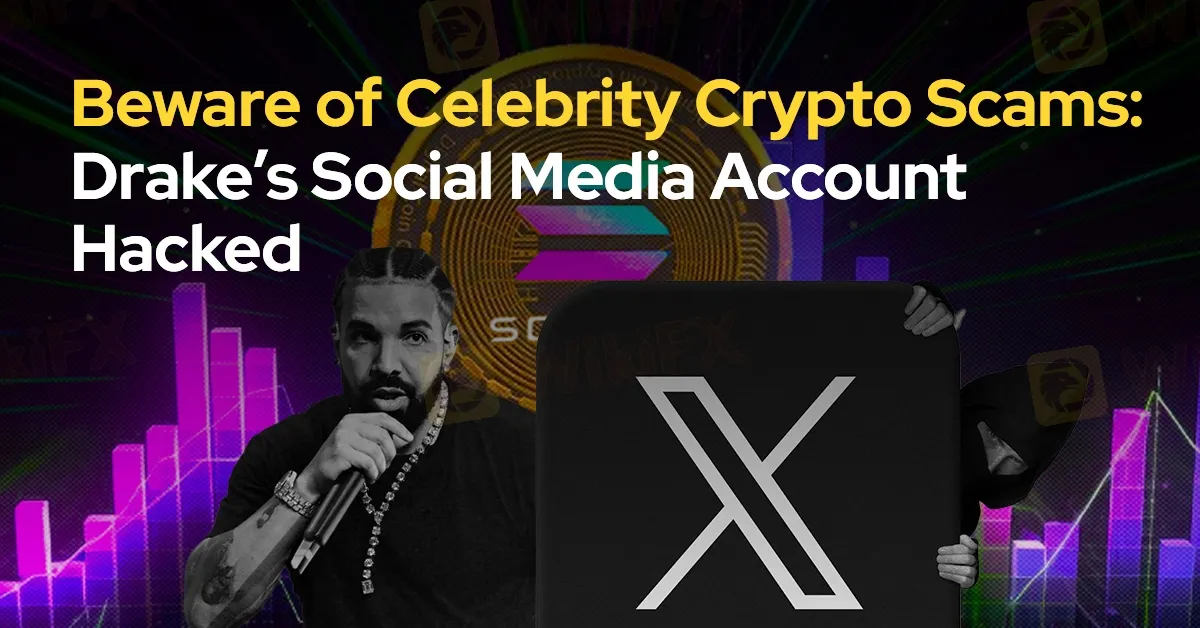简体中文
繁體中文
English
Pусский
日本語
ภาษาไทย
Tiếng Việt
Bahasa Indonesia
Español
हिन्दी
Filippiiniläinen
Français
Deutsch
Português
Türkçe
한국어
العربية
Beware of Celebrity Crypto Scams: Drake’s Social Media Account Hacked
Abstract:Celebrity-backed cryptocurrency scams have been making headlines again, with fans of Canadian rapper Drake falling victim to a fraudulent memecoin scheme.

Celebrity-backed cryptocurrency scams have been making headlines again, with fans of Canadian rapper Drake falling victim to a fraudulent memecoin scheme. The incident underscores a growing trend of scammers exploiting high-profile social media accounts to promote dubious tokens.
Drake‘s X (formerly Twitter) account was reportedly hacked over the weekend, leading to the promotion of a Solana-based memecoin named ANITA. The token, linked to the rapper’s cartoon alter ego “Anita Max Wynn,” was marketed under the guise of his well-known love for gambling. The name itself, “Anita Max Wynn” (a play on “I need a max win”), added a layer of believability to the scam, as did the claim that the token was launched in partnership with the gambling platform Stake.

Drake has a legitimate partnership with Stake, which further blurred the lines for his followers. The scam posts on his profile were amplified by the fact that his top pinned post also promotes the platform. Adding to the confusion, the name of the fraudulent token aligned with Drakes upcoming “Anita Max Wynn Tour,” scheduled for 2025 in Australia and New Zealand. Some fans may have assumed the token was part of a promotional effort for the tour.
Despite the posts being swiftly deleted and the token‘s associated account on X being suspended, the damage was already done. Reports show that during the short time the scam was live, trading volume for ANITA exceeded $5 million USD (approximately $7.8 million AUD). Many of Drake’s 39 million followers were drawn into the scheme before realising its fraudulent nature.
Drakes case is just the latest in a series of high-profile social media hacks targeting fans through fake cryptocurrencies. Crypto investigator ZachXBT recently traced similar scams to an Australian ex-eSports player known as Serpent. This individual has been linked to hacks involving celebrities such as Usher, Wiz Khalifa, and actor Dean Norris.
Other prominent figures, including Cardi B, Doja Cat, and the band Metallica, have also seen their accounts used to promote fake tokens. Even organisations like the Cardano Foundation have fallen prey to such tactics.
These scams tend to spike during crypto bull markets when increased public interest in digital assets provides fertile ground for scammers. With more newcomers entering the market, fraudulent schemes targeting celebrity followers become an effective way to capitalise on the excitement and lack of experience among investors.

Disclaimer:
The views in this article only represent the author's personal views, and do not constitute investment advice on this platform. This platform does not guarantee the accuracy, completeness and timeliness of the information in the article, and will not be liable for any loss caused by the use of or reliance on the information in the article.
Read more

Housewife Loses RM752,398 in Crypto Investment Scam
A 47-year-old housewife from Malaysia has fallen victim to a fraudulent bitcoin investment scheme, losing RM752,398 of her savings in just one month.

RM104.75M Forex Scam Sparks Outrage as Victims Seek Justice!
Over 388 victims, including retirees and professionals, lost RM104.75M in a forex scam allegedly led by a Russian. Victims rally for justice at BNM Penang.

Texas Investor Jailed for $1M Bitcoin Tax Fraud: First Case in History
Frank Ahlgren, a Bitcoin investor, faces 2 years in prison for concealing $4M in crypto gains. DOJ and IRS warn: crypto fraud is traceable.

Must-Know: Are Aptos and Rollblock the Next Big Winners?
Ripple ($XRP) whales offload holdings as exchange deposits rise. Aptos ($APT) gains despite token fears, and Rollblock ($RBLK) emerges as a 50x GambleFi gem.
WikiFX Broker
Latest News
HTFX Clone Firm Exposed
Forex Trading: A Beginner's Guide to Big Gains from Small Steps
Pips vs. Profits: A Trader's Dilemma
TradeExpert: A Forex Broker Under Scrutiny
IOTA Leads Blockchain Innovation in Southeast Asia by 2025
Beware of Celebrity Crypto Scams: Drake’s Social Media Account Hacked
GTCFX: Safe or Risky Scam?
Trade Nation: Safe Investment or Scam?
Forex Price Trend Prediction
Must-Know: Are Aptos and Rollblock the Next Big Winners?
Currency Calculator



